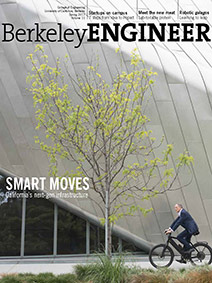Reading minds

Photo by Max Curran
Looking for better cybersecurity? Forget about typing in passwords or scanning fingerprints. The next frontier of identity verification is passthoughts, the recognition of unique brainwave patterns that occur when we perform mental tasks. Now, in a significant advancement of this technology, electrical engineering and computer sciences and School of Information professor John Chuang and his research team at the BioSENSE Lab have created a passthought reader that can authenticate the wearer by reading their brainwaves. Wearing the device, users can log into their devices and accounts when they picture a specific thought. This new wearable uses an ordinary set of earbuds fitted with electroencephalograph (EEG) sensors, unlike previous versions that placed electrodes across the user’s forehead or scalp. The researchers plan to develop a real-world version of the device, as well as fine-tune its accuracy to be more responsive to the wearer’s mental and physical states.

